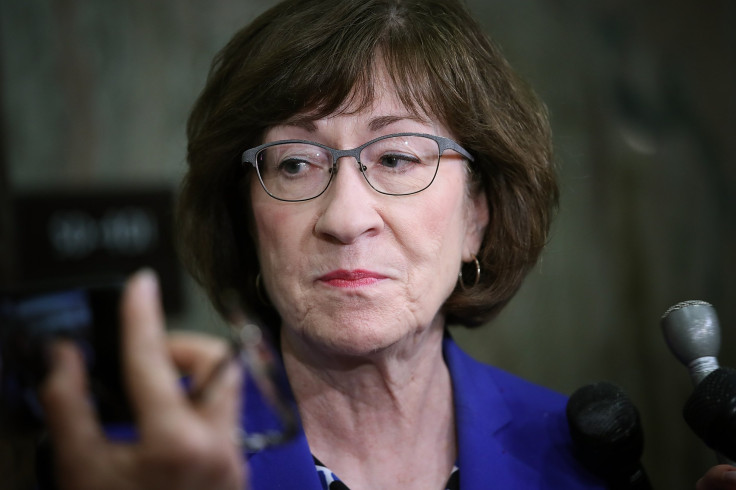Trump Impeachment Vote: GOP Senator Admits Trump's Behavior Is 'Flawed', Will Still Acquit

KEY POINTS
- Despite voting to call witnesses, Sen. Susan Collins finds Trump innocent of both the articles of impeachment
- She said the Democrats' "abuse of power" charge "did not even attempt" to prove Trump had committed a crime
- Collins, however, criticized Trump's behavior as "flawed"
Sen. Susan Collins, R-ME, who voted with Democrats last week to demand witnesses be called to testify in president Donald Trump's impeachment trial in the Senate, reverted back to type by announcing she'll vote to acquit Trump of both articles of impeachment. The Republican Senate will formally acquit Trump along party lines in a vote scheduled for Wednesday morning.
Speaking on the Senate floor Tuesday, Collins said she'll vote to acquit Trump on both articles of impeachment because she believes the Democrats' "abuse of power" charge "did not even attempt" to allege Trump had committed a crime. Instead, what the Democrats are presenting is a "difficult-to-define, non-criminal act," in her opinion.
Collins, however, criticized Trump's behavior as "flawed." At the same time, she attacked House Democrats for delaying transmitting the articles of impeachment to the Senate for more than a month. She claims this stunt undercut the Democrats' arguments Trump is an imminent threat.
Collins went on to explain why she'll vote to acquit despite the amount of evidence and testimony against Trump uncovered during the House impeachment inquiry.
“I do not believe the House has met its burden of showing that the president’s conduct, however flawed, warrants the extreme step of immediate removal from office,” said Collins.
She asserts Trump's conduct doesn't constitute an impeachable "abuse of power" as Democrats had attempted to define the term.
"The House Judiciary Committee identified in its report crimes that it believed the president committed," according to Collins. "Article I, however, does not even attempt to assert that the President committed a crime. I sought to reconcile this contradiction between the report and the Articles in a question I posed to the House Managers, but they failed to address that point in their response.
"While I do not believe that the conviction of a President requires a criminal act, the high bar for removal from office is perhaps even higher when the impeachment is for a difficult-to-define noncriminal act. In any event, the House did little to support its assertion in Article I that the president 'will remain a threat to national security and the Constitution if allowed to remain in office.'"
The Democrats' failure to answer her objection was a key reason why she'll vote to not remove Trump from office, said Collins. She did, however, admit "the investigation into the Bidens’ activities requested by President Trump was improper and demonstrated very poor judgment." But she added a caveat: there was conflicting evidence in the record about Trump's motivation for the request.
"The House Managers stated repeatedly that President Trump’s actions were motivated 'solely' for his own political gain in the 2020 campaign, yet the president’s attorneys argued that the President had sound public policy motivations, including a concern about widespread corruption in Ukraine," said Collins in echoing the White House' line of reasoning.
"Regardless, it was wrong for President Trump to mention former Vice President Biden on that phone call, and it was wrong for him to ask a foreign country to investigate a political rival."
© Copyright IBTimes 2025. All rights reserved.





















